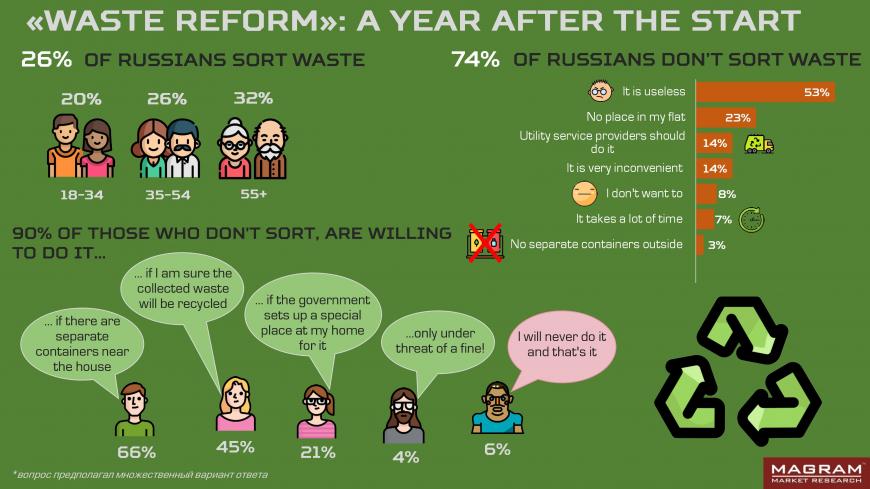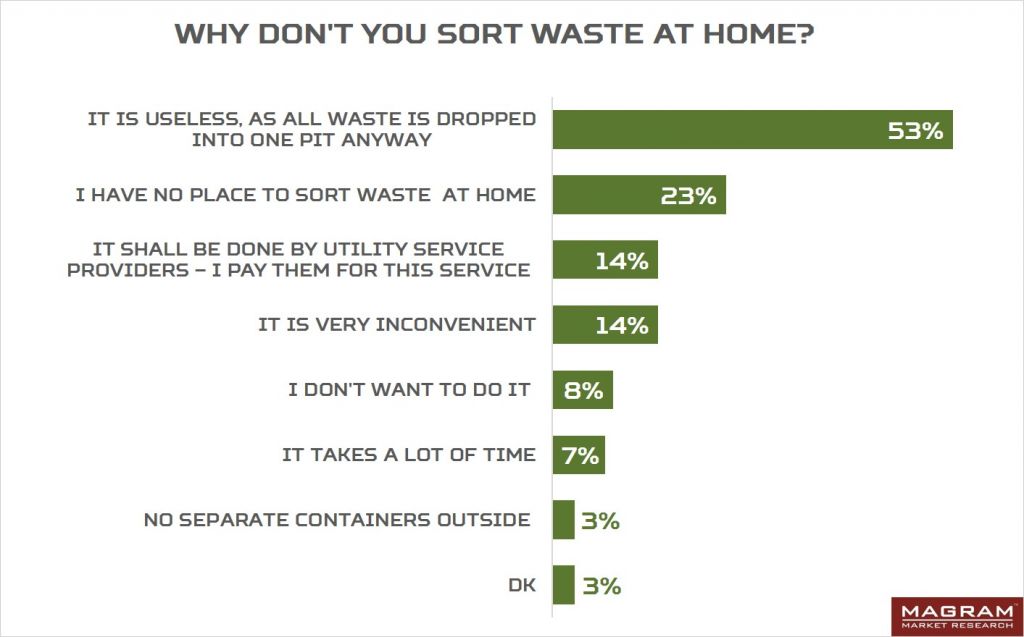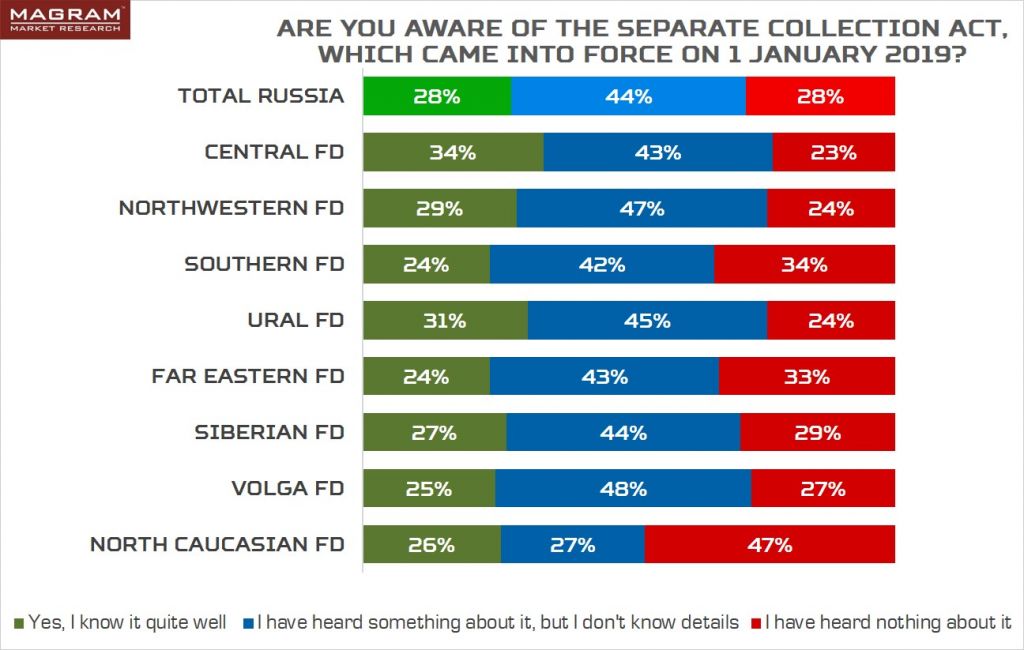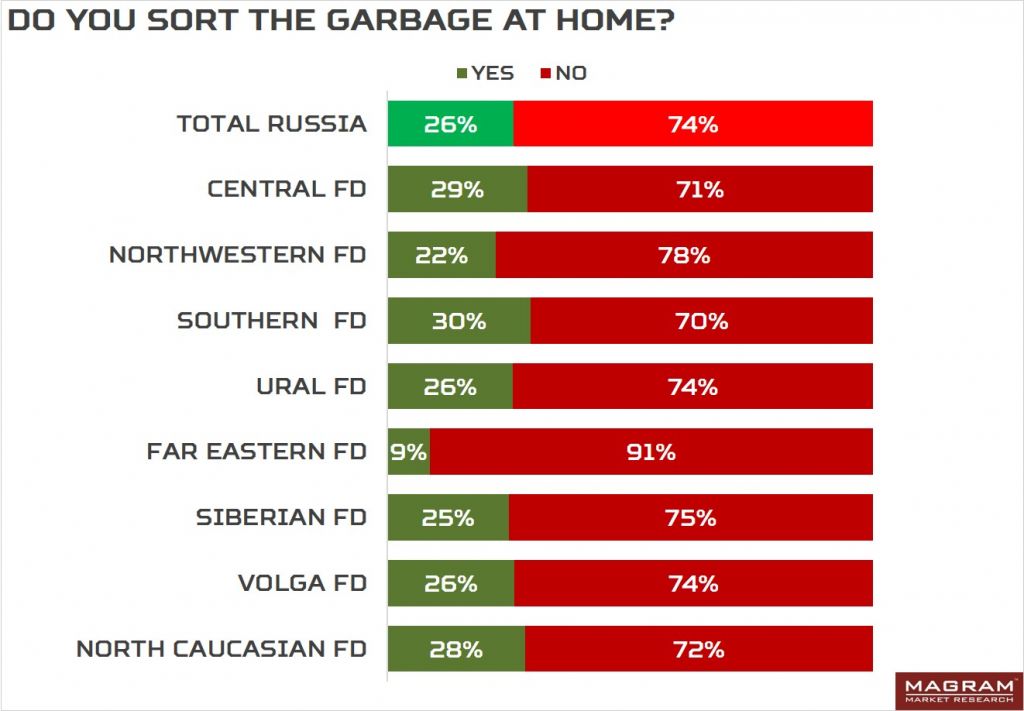After the «Waste Reform» First Year 26% of Russians Are Sorting Waste
What is the Russians’ attitude to waste sorting a year after the reform start

On January 1, 2019 the «waste reform» was started in Russia. The main goal of the reform is to eliminate illegal disposal sites and landfills, revitalize and use contaminated lands, improve the overall ecology situation.
According to national project «Ecology», the planned reform results are as follows: by 2024 the volume of burnt and processed waste (Solid Household Waste, SHW) shall be increased fr om 3% to 60%. Also by 2024 it is planned to liquidate 191 illegal disposal sites within the city zones (identified as of the reform start) and 75 most hazardous objects of accumulated environmental damage.1
The «waste reform» will be fully deployed in the territory of our country starting with January 2022. However in the majority of regions the program of separate waste collection has already started.
***
MAGRAM Market Research identified, what Russians think about waste sorting a year after the start of the reform. In January MAGRAM conducted a research in Russia covering 2,500 respondents 18+. The sample represents the public opinion across all federal districts of Russia.
It was identified that even today a bit more than a quarter of Russia’s population are sorting waste — 26%.
Those, who do not (74%) explain their decision by the following reasons (multiple answers):
• 53% believe, that it is useless, as all waste is dropped «into one pit» anyway;
• 23% have no place in their flats to sort waste;
• 14% think it is inconvenient;
• 14% believe it shall be done by utility service providers, as «we pay them for this service»;
• 8% just do not want to do it <з>
However 90% of Russians, who do not sort waste today, are ready to start doing it if:
• separate containers are placed at their blocks of flats — 66%,
• they are sure the collected waste will be processed separately — 45%,
• if they are helped to organize separate waste collection at home (e.g. provided with containers) — 21%,
• they are threatened with penalties — 4%.
6% of the respondents will never sort waste.
Another 4% answered DK.

In spite of a popular opinion about young people's high social and ecology responsibility, the research revealed, that young people under 34 y. o. demonstrate the biggest «resistance» to the waste reform. Least often (20%) waste is sorted by respondents under 35 y. o. (vs. 26% total Russia).
The most active «sorters» are those respondents, who are on pension or are going to retire, 55+ (32%). And they are aware about the law best of all — 78%, at the same time 36% know the law well (vs. 28% total Russia).
In general Russians are aware rather well about the law on separate waste collection: only 28% of the respondents have never heard about it, 44% have heard about it, but do not know the details and 28% know the law well.

Regions
In federal districts the situation with waste sorting is about the same, only Far East is outstanding: only 9% of the respondents are sorting waste there. However the region has the lowest % of those, who will never sort waste — 2% (vs. 6% total Russia).

It is interesting, that in the North-West the main reason not to separate waste — it is useless, «as all waste is dropped «into one pit» anyway»: 68% vs. 53% total Russia.
However 73% of the North-West citizens are ready to start waste sorting, if separate containers are placed at their blocks of flats (vs. 66% total Russia).
Note, that in Moscow Oblast, wh ere the law came into effect in January 2019, waste is sorted the most actively today — 41% (vs. 26% total Russia). At the same time comparing to the Center, the respondents of Podmoskoviye most often doubt in the usefulness of their waste sorting at home — 61% of those, who do not sort waste, believe, that it is useless — «as all waste is dropped «into one pit» anyway» (vs. 48% Center).
The research was made in January 2020. The survey covered 2,500 respondents 18+. The sample represents the public opinion across all federal districts of Russia.